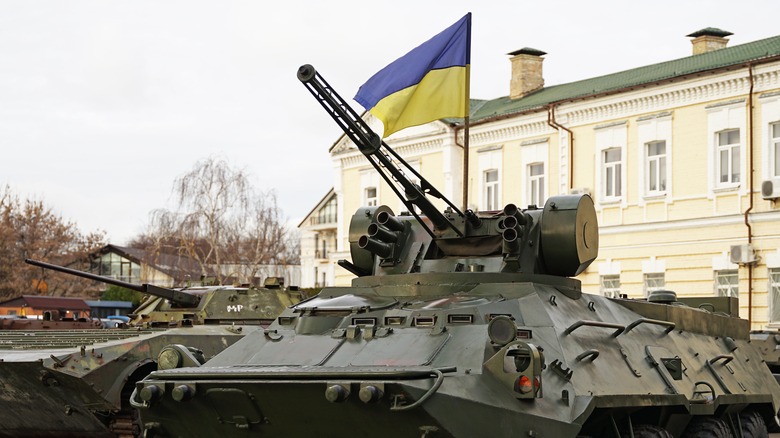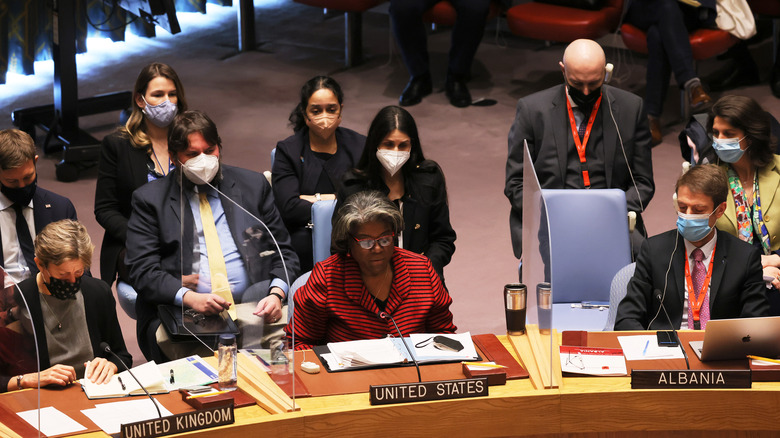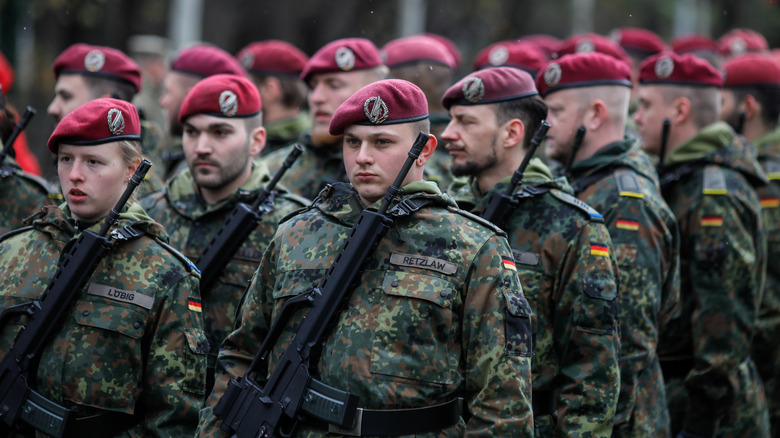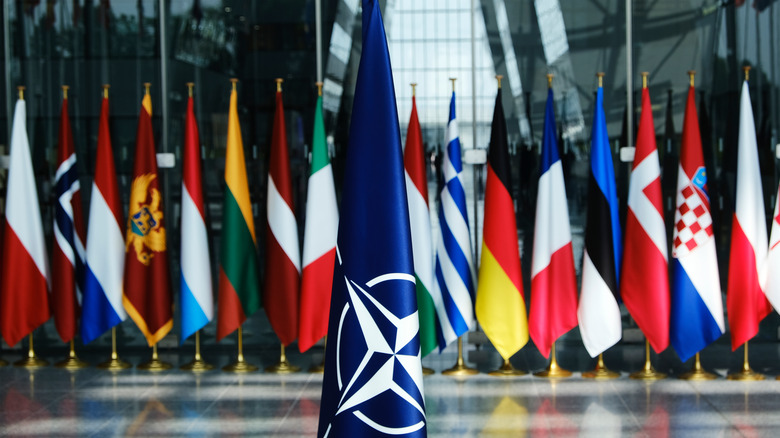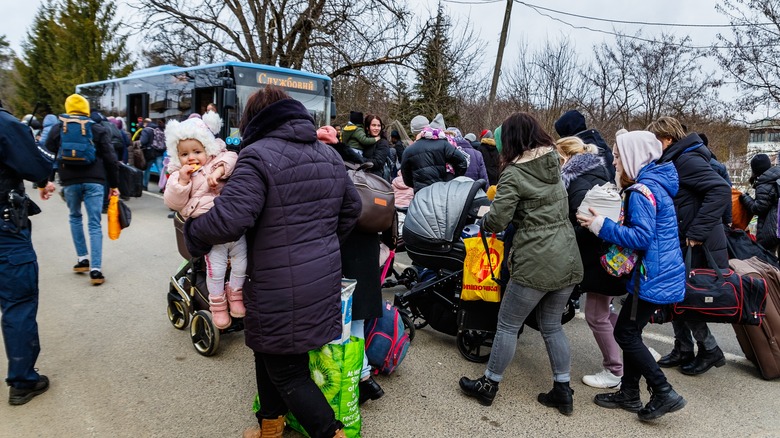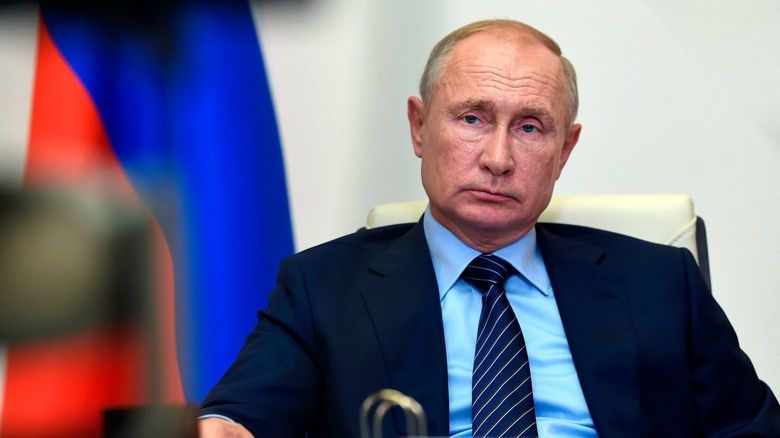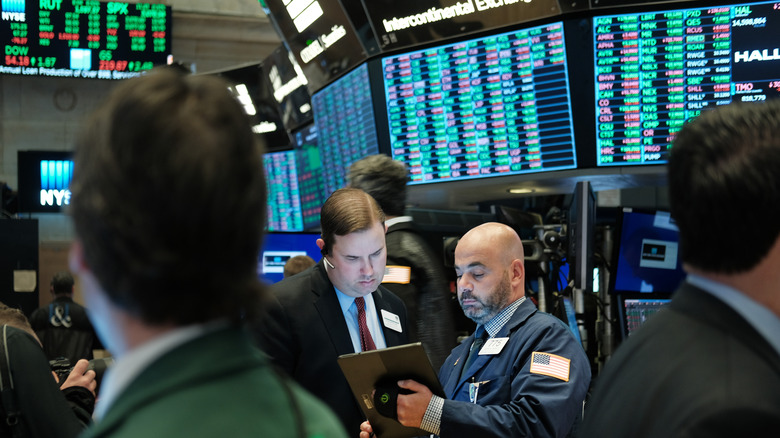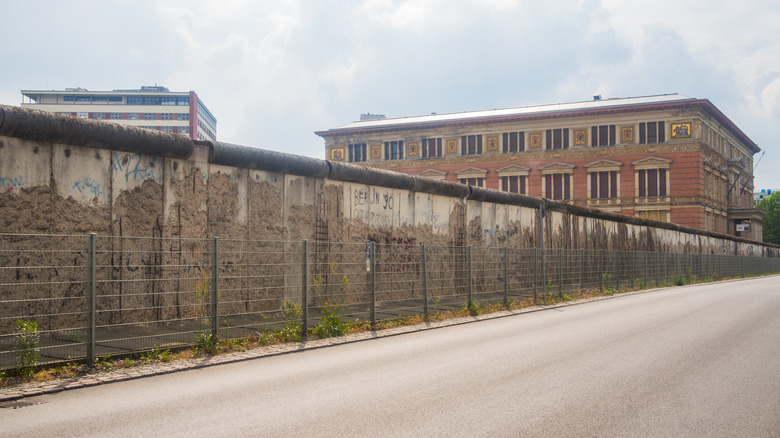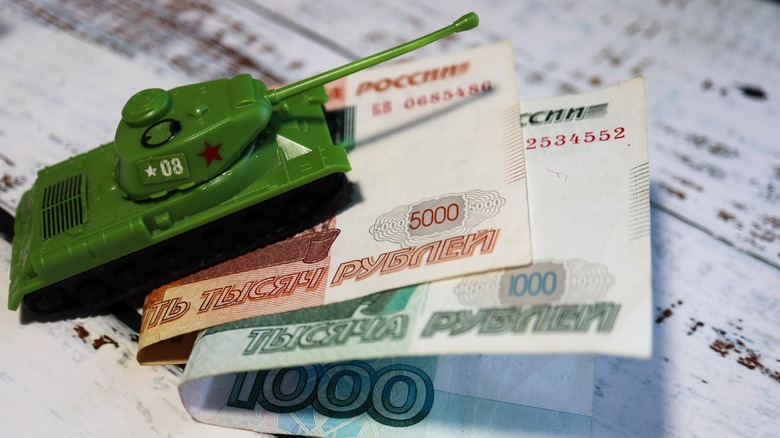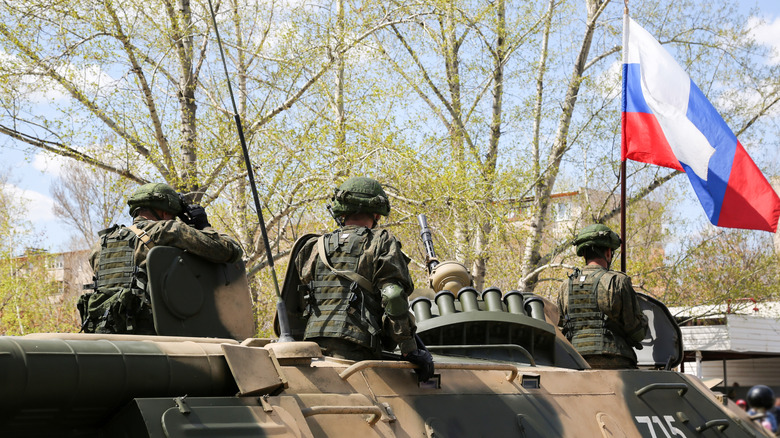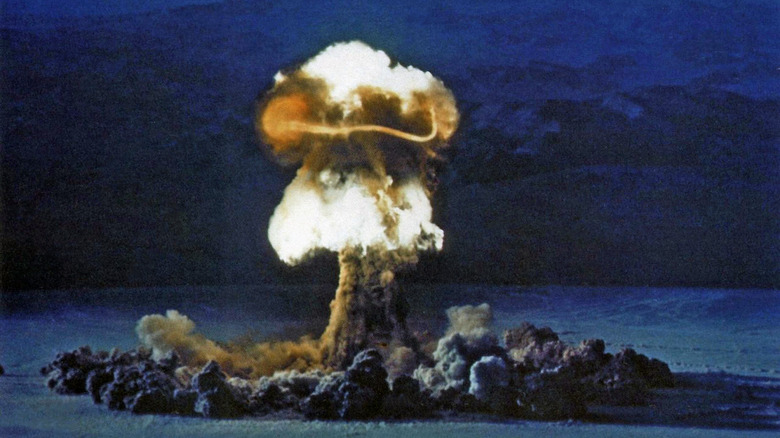How The War In Ukraine Could Change The World Forever
Some conflicts have impacts that are still felt generations later. The French Revolution and subsequent Napoleonic Wars upset the monarchical authority structure that had dominated Europe for centuries, according to Origins. The borders created, shifted, or erased by World War I reshaped the global map in ways still at issue today. From the ashes of World War II rose the United Nations, a body that serves as forum for (almost) every nation on earth to liaise with one another.
Then, as unbelievable as it can seem for those living through the horrors of the moment, other conflicts erupt, rage, and pass with surprisingly little notice — or at least little lasting notice. How often have you thought about the Korean War? Likely little, though that conflict may well have turned the Cold War hot at a time when the Soviets first developed nuclear weapons, according to Britannica. How often do you think about the Eritrean War of Independence, which lasted three decades, per BBC? Do you think much of Russia's 2008 war against Georgia or its 2014 annexation of Crimea?
On or off your radar, these wars have all left major lasting impacts on their regions and have had at least some lasting impact on the larger world. The sudden, unprovoked, and savage war taking place in Ukraine may break the mold of being quickly forgotten, though: this war of Russian aggression may change the world forever and in ways that no one will be able to forget or ignore.
There may be a shift in global order
Despite a number of so-called proxy wars fought around the world, since the close of World War II the world has been a relatively stable place. According to National Geographic, these proxy conflicts, including the Korean War, the Vietnam War, and the Soviet invasion of Afghanistan, to name a few, pitted armies or militant groups aligned with America against combatants aligned with the USSR, with all wars fought during these Cold War years carefully contained both in terms of geography and scope.
Why the containment? Because a larger war could have brought the larger NATO alliance into direct conflict with the Eastern Bloc and allies of the USSR, leading to a global conflagration. During the Cold War and even after the collapse of the Soviet Union in the early 1990s, a balance remained in place in which the richer, better-armed nations of the world tacitly agreed not to directly fight with one another and, beyond that, not to get overly involved with the politics, economics, and societal functioning of nations near the orbit of their adversaries.
That has all changed now. When Russian invaded Ukraine without cause or justification, it beached the practice of restraint that has largely ensured peace in the modern world. According to Vox, one major outcome of Russia's action may be a resurgence of martial will among European nations. No longer content to merely decry unjust actions, these nations and others are providing direct material support to Ukraine and loudly restating a devotion to the NATO alliance, a coalition Russian president Vladimir Putin counted on as being weak, not resilient. Even after this war ends, a newly energized Europe may remain, and an America ready to reassert its place on the global stage may stand back up.
Current levels of inflation may be felt indefinitely
According to the Merriam-Webster Dictionary, in terms of economics, the word "inflation" means "a continuing rise in the general price level usually attributed to an increase in the volume of money and credit relative to available goods and services." The most common causes of inflation are consumer demand outpacing supply for the wanted goods, which leads suppliers and retailers to elevate prices in response. But what causes this shortage of the supply of wanted goods and leads to inflation, such as the 40-year-high inflation rate of 7.9% we're seeing right now, according to reporting from The Wall Street Journal?
There are many factors, as is always the case with large scale economic issues, be the issue inflation, recession, or even the rarer boom times. One thing still very much at play is the global COVID-19 pandemic, which seems to be nearing its end in many ways, but which has still wreaked havoc on production and supply of all manner of goods in recent years, according to data sourced directly from The White House. Another reason for current inflation is, of course, the war in Ukraine.
According to the views of economic experts relayed via The Wall Street Journal, this conflict that has already sent gas prices soaring is also likely to increase the price of commodities like grain, cooking oils, metals, and more, and prices are unlikely to simply fall again once the guns fall silent. If past wars provided precedent, inflation caused by the war in Ukraine will remain high for years to come, and seeing as it was already an issue based on the pandemic, prices may be permanently altered in some places.
European nations may adopt more robust military stances
The continent of Europe, after decades marked by nearly constant wars — from the late 1700s to the 1940s, not one generation of Europeans was without at least one major conflict rending apart much of the territory — has enjoyed relative peace since the end of World War II, at least in most of Western Europe. Most nations, such as Germany, the main aggressor of World War II, have conscientiously kept their militaries small and adopted nonaggressive policies of minimal intervention in foreign conflicts. Other European nations, such as the United Kingdom, have engaged in a bit more martial action, such as in robust support of American-led coalition actions during so-called War on Terror operations, via Politico. But writ large, European nations have largely avoided direct intervention in foreign conflicts and have looked principally to defending their own borders.
That seems set to change as a result of Russia's savage disregard for the borders of Ukraine. According to War on the Rocks, Germany in particular seems poised to rise up as a military power after nearly seven decades of self-imposed martial reticence. Mere days after the Russian invasion began, the German government announced new spending on defense (which can be a euphemism for offensive capabilities as well — remember America's "Department of Defense" role was in fact called the "Department of War" until mid 1947, via Britannica) and began actively delivering weapons to Ukraine despite having heretofore avoided all deliveries of actual weaponry to nations at odds with Russia.
Other European nations are also finding a renewed sense of martial vigor, with soldiers from France and the U.K. deploying to eastern European nations and countries such as Spain and Denmark providing war material including aircraft, according to the Atlantic Council.
NATO may grow stronger than ever
NATO, the North Atlantic Treaty Organization, is a group of countries, predominately from Western Europe and North America, via NATO's own webpages, that banded together during the Cold War as a bulwark against potential Soviet aggression. The cornerstone of the NATO charter is an agreement that any attack by any foreign adversary against any NATO member will be treated as an attack on all members (via The Office of the Historian). That agreement has stayed in place even after the end of the Cold War that spawned the group. And it has remained, in theory, a powerful deterrent against aggression.
Here's how it works: If Russia were to attack, say, France, all NATO members would respond as if their nation had been directly attacked. The same would be the case were, say, Brazil to attack Canada. Or South Africa to invade Spain. And so on. In recent years, NATO has often seemed more of a treaty on paper than a group of militaries genuinely poised to act as one, and it seems Russia's Vladimir Putin made a gamble on this being the case, a gamble he is losing. Rather than revealing itself as a paper tiger, NATO is proving to be a proud, robust alliance.
According to a briefing issued by the Atlantic Council, NATO members have rededicated themselves to defending every inch of NATO territory against any attack or invasion. Doubling down on this generally held position, British health minister Sajid Javid recently said that "a 'single Russian toecap' on NATO territory would be considered an act of war," per The Guardian. And nations previously hesitant to join NATO, such as Sweden and Finland, are considering applying for membership, according to reporting from Vox.
Many Ukrainian refugees may never return home
According to data assembled by the BBC, at the time of this writing, nearly 3 million people have fled Ukraine as war ravages the country. That means that almost 7% of all Ukrainians have left their homeland, based on the World Bank's population estimate of the country, which was 44.13 million people prior to this ongoing conflict.
And based on the precedent set by far too many conflicts we have seen before, there is a good chance that a large number of Ukrainians who have fled their homeland as the Russians invaded will never again call Ukraine home. That's because a notable percent of war refugees never live in their homeland again, according to studies conducted by the Immigration Policy Lab. Most Ukrainian refugees today are in Poland, though Hungary, Slovakia, Moldova, and Romania have taken on many as well. And many refugees are pushing on farther, headed to Germany or France (via The Guardian) or even the U.K., and the farther they get from home, the greater the chance they may not return, especially if the war drags on or proves highly destructive to property and infrastructure in Ukraine.
That number of refugees, the nearly 3 million who have left the nation, does not include an additional 1.85 million people who are internally displaced, according to the BBC, which means they are still in Ukraine but have nonetheless been driven from their homes. With those numbers added to the total, over an astonishing 10% of all Ukrainians have been displaced so far.
Putin may lose clout or even lose his office
Russian president Vladimir Putin has been in charge of his nation since the most recent turn of the century. Appointed prime minister and then made interim president in late 1999 by Boris Yeltsin, via Radio Free Europe, Putin has served as the president of the Russian Federation for almost two decades, with another stint as prime minister in between terms in office during which his crony Dmitry Medvedev held the office of the presidency, keeping it warm for Putin as the autocrat kept up the appearances of democratic rule (via The Washington Post).
Per The Guardian, thanks to a rule change jammed through during his current six-year term as president, Putin looked set to hold the presidency until the year 2036, which would mean he would have ruled over Russia (for presided is hardly the term here) for more than three and a half decades. And up until recently, it looked like an almost foregone conclusion that Putin would remain in power atop Russia for that long, barring an unforeseen illness, accident, or perhaps an assassination — in other words, no one inside Russia was going to take this man down.
But Putin may well have ruined his own prospects for another dozen-plus years of power based on his rash, violent invasion of neighboring Ukraine. According to an opinion piece published in The Hill, by forcing this war upon Ukraine, Putin may have finally revealed himself as an unstable leader who cannot be trusted, potentially even by those who have long benefitted by staying in his orbit. Putin may face a backlash at home that eventually forces him from power, and that backlash could come from protests in the streets, rancor on social media, or even mutiny in the halls of the Kremlin.
International stock markets may see a permanent loss in value
So far this year, the Dow Jones Industrial Average has fallen from record highs around 37,000 points to its current position around 33,000 points (via Market Watch). The Standard and Poor's 500 (aka: the S&P 500) was at around 4,800 points at the start of the year, but is today at just 4,240 points (via Market Watch). And the Nasdaq Composite Index, which was around 16,000 points as 2022 began, is now far down, just under 13,000 points at the time of this writing. Stock markets go up and down all the time, and often many major indexes go down at the same time — especially after larger increases — in what economists usually call a market "correction."
These corrections are usually triggered by economic forces, but of course they can be set off by other causes as well. And one thing that commonly causes markets to lose value is, indeed, war. And this war has been called a "catastrophe" for the world economy by World Bank Group president David Malpass, according to CNBC's Make It. Malpass and others warn that not only is inflation likely to stay high for long to come, but that global markets will likely be destabilized and damaged irreparably, meaning this will not be a common correction but rather an actual loss of value.
Gasoline prices may never be low again
In many parts of the world, the days of the gasoline-powered automobile are already numbered. According to reporting from CNBC, the Biden White House last year set out a goal for just over half of all new vehicles to be sold in America to be electric by the year 2030, for example. In Europe, recent goals were set to entirely curtail greenhouse gas emissions from passenger vehicles by the year 2035, via the European Environment Agency, with electric vehicles replacing fossil-fuel-powered autos.
But for now, most of the world's vehicles still run on gasoline, and that gas has gotten significantly more expensive in recent days. In fact, according to data cited by the New York Post, gas prices have been sent to record highs because of the Russian war of aggression in Ukraine. And according to that same New York Post reporting, prices are unlikely to come down by any appreciable amount for many months, and we may not see the lows paid just a year or so ago for a long time.
According to AAA's reporting on national average gas prices, at the time of this writing, the national average price of a gallon of gas in America is $4.31 for regular unleaded fuel. The highest per gallon average price for a state is $5.75 in California, while the lowest is $3.81 in Kansas.
A new 'Iron Curtain' may be formed
According to the National World War II Museum, the term "Iron Curtain" was first used to describe the intangible — but certain — dividing line between the USSR and the West by former British Prime Minister Winston Churchill during a speech made on March 5, 1946. Churchill was speaking to an audience gathered at Westminster College in Fulton, Missouri, having come to that midwestern locale at the invitation of American president Harry Truman. The term Churchill coined in that speech would go on to largely define Western-Soviet relations for the next 45 years until the breakup of the Union of Soviet Socialist Republics in the 1990s.
Though the Soviet Union is no more, it is seeming more and more likely that the old dividing lines between its predecessor-cum-successor (Russia, in other words) and the Western world, are being drawn ever more clearly. According to an economist quoted in CNBC, Vladimir Putin seems almost intent on establishing a new Iron Curtain type of relationship (or lack thereof) between Russia and its allies and the Western nations at odds with Russian ascendance. This desire for a defined and powerful sphere of influence was, in fact, one of Putin's major reasons for invading Ukraine: by weakening or even subverting his nation's neighbor, Putin sought to create a buffer state between Russia and the NATO nations to the west. He badly miscalculated what it would take to weaken Ukraine, however, and instead of shoring up an intangible wall, he has poked very tangible holes in the security and stability of his own homeland (via The Hill).
Russia's economy may never fully recover
The Russian economy was not exactly doing all that well before Putin decided to force an invasion of Ukraine. According to data sourced from Trading Economics, in the year 2020, Russian GDP was around $1,483.50 billion which may sound like a lot, but now compare it to the American GDP from the same year, which was $20,936.60 billion, or 14 times larger, and you'll see that Russia was lagging.
Now consider how badly things have taken a turn in Russia since the start of this 2022 invasion of Ukraine. Today, one Russian Ruble is worth 0.0093 United States dollars, while just one month ago the Ruble was worth 0.013 dollars (via Exchange Rates). The value of the nation's currency has plummeted, in other words, and it may never rebound fully.
In the early days of the war, there were runs on Russian banks and cash machines (via CNBC), Russia closed all of its major stock markets, and it saw its exports banned in scores of nations, via reporting from Bloomberg and CNBC. Without money coming in based on fuel and wheat it ships out, Russia is poised to fall into recession and, cut off from almost all international banking thanks to harsh economic sanctions imposed on it by America, Europe, and beyond, Russia has few lifelines to rescue itself from economic ruin. The damage its military does in Ukraine may lead to permanent economic damage within Russia itself.
Future wars of aggression may become more common
If current will holds strong both in Ukraine and among the many nations supporting the Ukrainians, it's entirely possible that aggressive actions like those just taken by Russia will become less common in the near future — after all, it seems the Russian invasion has largely faltered and stalled, and the war has galvanized global opposition against this unwarranted war. On the other hand, if the unified resistance to the invasion flags and if Ukraine is ultimately conquered and subdued, things might go quite the other way in the near future.
If Russia is not rebuffed quickly and punished robustly, then many other regions ripe for invasion had better watch out. That includes Taiwan, long a target of conquest for China (via BBC), the Kashmir region, long claimed by both India and Pakistan (via BBC), and on it goes. The danger here is that if Russia pulls off its aims in Ukraine, muddled as they appear at present, then to certain other nations around the globe, it may look like simply attacking and taking what you want works, and that the world actually won't do that much to stop such actions. The world order and the entire view on a war's justification could be completely changed
Witness the tepid responses to the invasion, for example, from China and India, which according to Vox have worked hard to maintain ties with Russia even at a time when most of the world is openly decrying Putin and his ilk. Might leadership from those nations also be studying the playbook here?
It could lead to a global nuclear conflict
Nuclear weapons have been used a sum total of twice in all of human history, on August 6 and August 9, and both times they were deployed by the United States against Imperial Japan. The fact that no nuclear bomb has been used since is a testament to just how awfully destructive these weapons are. For all the many decades of the Cold War, that awful power was kept at bay largely thanks to the fact that both sides in said "war" were well armed with nukes, and no one really wanted to go the whole Mutually Assured Destruction (or MAD) route, via Britannica.
The Cold War may have ended in principle, but the nuclear weapons so oft associated with it never went away. According to the Arms Control Association, there are currently nine nations with nuclear weapons, the total of which is around 9,600 weapons in a state ready to be used militarily. (A few thousand more are awaiting decommissioning.) Far and away, the majority of these nuclear arms are held by Russia, which has some 6,257 nuclear weapons at present. The United States is a close second, with 5,550 nuclear weapons readied. (And you can add more than 500 more when you loop in nuclear-armed NATO members the U.K. and France.)
At present, the West is committed to avoiding direct conflict with Russia, which is of course in Russia's interest as well. But if this war spreads and NATO nations become involved, according to a briefing published in Fortune, it's possible — though improbable — that Russia would turn to its most powerful weapons, which would in turn compel a nuclear response, which could very well lead to death and destruction on a scale we just can't fathom.
